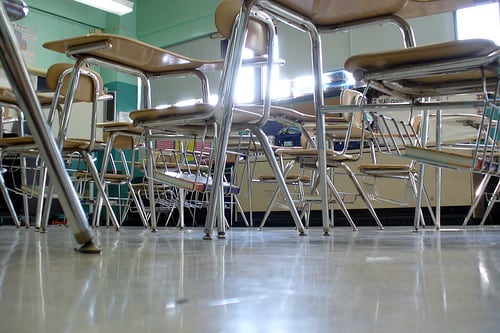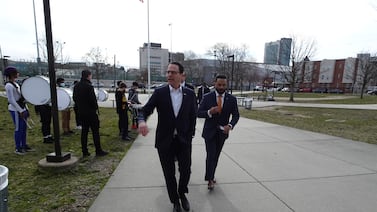Estimates showing big declines in state education revenue have Detroit district leaders reassessing salary increases, while also focusing on hiring new teachers in the fall.
Superintendent Nikolai Vitti made a recommendation Monday to put a “hold” on any salary increases for the next school year.
Vitti said the district had been planning to offer permanent salary increases based on a budget proposal presented earlier this year by Gov. Gretchen Whitmer, which called for increases in per pupil funding.
But the economic impact of COVID-19 has resulted in projections that revenue for schools could be down as much as 6% to 13%, Vitti said. The district is exploring how to keep current staff members working in order to prevent layoffs.
If state school allocations are reduced, “then our proposed budget will need to prioritize protecting jobs and current salaries and wages,” Vitti said in an email Monday night. “We could consider bonuses depending on the extent of state reductions, enrollment, and federal funding.”
The district is expected to propose a budget in May and submit it to the board for approval in June.
Terrence Martin, the president of the Detroit Federation of Teachers, the union that represents teachers, counselors, and other school employees, said the union understands the district may face state funding cuts, but they are still pushing for the increased pay.
“We certainly plan to bargain in good faith with the school district for increases that our members deserve,” Martin said.
The current contract was approved in 2017 and included an increase in wages of more than 7% over two years, partly to make up for cuts made during years of emergency management. The third year, which was not negotiated until last year, provided salary increases for some and bonuses for others. The current contract expires at the end of this school year.
Earlier Monday, during a school board committee meeting, Vitti said the district would look to expand work duties for some employees during the school shut-down, and also if schools do not return full-time in the fall. For instance, a bus aide may be asked to perform the work of a cafeteria worker or custodian. This would require approval from the district’s workers unions, including the DFT.
“The world is changing. And the complexities linked to work in the school setting are changing as well. And we are willing to work with everybody to ensure employment and everyone’s salary, but there has to be a give-and-take in this situation,” Vitti said.
Martin said the district will need to take into consideration the challenges employees will face.
“These folks are professionals. They are trained. And it’s not easy to go from one classification to another and be willing to do so,” he said. “It’s not easy to be a bus driver. It’s not easy to be a custodian. It’s not easy to be a teacher. So, you know, we cannot act as if it’s easy for anyone to just fly over to another position.”
The district will get some economic relief through the Coronavirus Aid, Relief, and Economic Security Act, or CARES Act. Vitti said he’s not yet sure how much the district will receive. But he said that although it might be used to cover current salaries, it won’t be used to provide salary increases because it’s one-time money that will not be renewed.
The lack of federal money in addition to what’s provided in the CARES Act could result in big job losses across the nation. The Council of the Great City Schools, a national coalition focused on urban education, estimated a 20% decrease from state and local sources for large city school districts. That’s why the coalition urged federal lawmakers Tuesday to approve an additional $175 billion dollars to support schools. Vitti is one of several school leaders that signed the advocacy letter, which also noted that without the financial boost, it’s estimated that 275,000 teacher jobs could be cut across the country.
There are also other factors that may affect the district’s budget, including enrollment, higher employee health care costs, and the challenge of renewing a Wayne County tax that has provided about $80 million annually for school districts. Voters will decide on the tax renewal in November. The district has used revenue from it to pay for salary increases.
Teacher recruitment is another district priority going into the fall, Vitti said. There are currently 100 teacher vacancies, and it’s estimated that 60 percent of the district’s teachers will retire within the next five years. The district is considering using what money is available to hire more teachers, especially if class sizes must be reduced to adhere to social distancing.
The recent investment into providing devices and internet access to all of the district’s students also puts them in a better position to attract teacher candidates.
“There’s even more positive energy about the district. And this is an opportunity to recruit teachers that may feel economically unstable in other districts, mainly charter schools in the city. So we need to use this to our advantage,” Vitti said.







